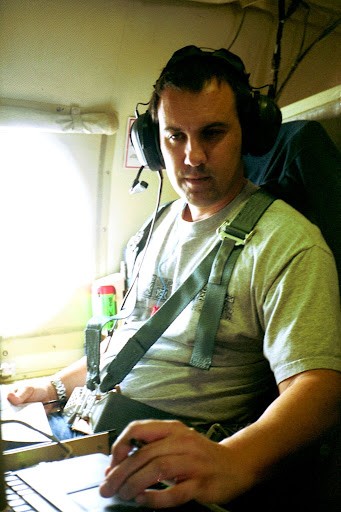
Research Highlights
Research Interests
Convective- and vortex-scale processes and how they impact tropical cyclone (TC) structure and intensity change, using a combination of aircraft observations and numerical models.
Robert (Rob) Rogers, Ph.D.
Lead Meteorologist, Hurricane Research Division
305.361.4536
4301 Rickenbacker Causeway
Miami, Florida 33149
“I’ve always been fascinated by severe weather and have strived to understand why it occurs. To have the ability to apply that knowledge to make better forecasts that protect life and property is an amazing opportunity.”
Dr. Robert (Rob) Rogers is an employee of NOAA’s Hurricane Research Division (HRD) in Miami, FL. His main areas of research involve studying the role of convective- and vortex-scale processes in tropical cyclone (TC) structure and intensity change, using a combination of aircraft observations and numerical models. He is an active participant in HRD’s annual hurricane field campaign, and he served as Director of the field campaign in 2005, 2010, 2015, and 2016, and Science Director in 2023. He has flown into numerous hurricanes during his career, including some of the most noteworthy in recent memory, including Hurricanes Dorian, Irma, Michael, Harvey, Rita, and Katrina. He has made more than 250 eyewall penetrations during this time, experiencing a wide range of conditions ranging from lightning strikes in outer rainbands to periods of zero gravity during eyewall penetrations of rapidly-intensifying hurricanes.
Dr. Robert (Rob) Rogers is currently Editor at Journal of Geophysical Research – Atmospheres, Associate Editor for Journal of the Atmospheric Sciences, and Vice Editor-in-Chief for Tropical Cyclone Research and Review, and he has also served as Associate Editor for Monthly Weather Review and Weather and Forecasting. He has published research in Journal of the Atmospheric Sciences, Monthly Weather Review, Bulletin of the American Meteorological Society, Geophysical Research Letters, and the Quarterly Journal of the Royal Meteorological Society, as well as book and encyclopedia chapters. He has also chaired national and international committees and workshops within the American Meteorological Society (AMS) and World Meteorological Organization (WMO). He has received the Banner I. Miller Award, which is an AMS award for outstanding contribution to the science of hurricane and tropical weather forecasting in a publication with international circulation as well as Editor’s awards for excellence in reviewing from AMS and AGU. He has done many media interviews with domestic and international outlets, including being interviewed for Science and The New York Times, and he has appeared on the Today Show, MSNBC, and Fox News to discuss his research.
1998, Ph.D. Meteorology, The Pennsylvania State University, State College, PA
1995, M.S. Meteorology, The Pennsylvania State University, State College, PA
1991, B.A. Environmental Science, University of Virginia, Charlottesville, VA
- Fischer, M.S., R.F. Rogers, P.D. Reasor, and J.P. Dunion. An observational analysis of the relationship between tropical cyclone vortex tilt, precipitation structure, and intensity change. Monthly Weather Review, 152(1):203-225, https://doi.org/10.1175/MWR-D-23-0089.1 2024
Ref. 4350 - Shimada, U., P.D. Reasor, R.F. Rogers, M.S. Fischer, F.D. Marks, J.A. Zawislak, And J.A Zhang. Shear-relative asymmetric kinematic characteristics of intensifying hurricanes as observed by airborne Doppler radar Monthly Weather Review, 152(2):491-512, https://doi.org/10.1175/MWR-D-22-0340.1 2024
Ref. 4375 - Aberson, S.D., J.A. Zhang, J. Zawislak, K. Sellwood, R. Rogers, and J.J. Cione. The NCAR GPS dropwindsonde and its impact on hurricane operations and research. Bulletin of the American Meteorological Society, 104(11):E2134-E2154, https://doi.org/10.1175/BAMS-D-22-0119.1 2023
Ref. 4330
May 2020 NOAA Employee/Team Member of the Week Award: COVID-19 Response
For his participation on NOAA’s Budget Formulation and Execution Team to minimize and mitigate the impacts of COVID-19 to NOAA’s budget function. Due to the team’s efforts, NOAA obtained $20 million for staffing, cleaning and IT support needed to ensure the continuity of its operations, as well as $300 million in direct assistance for impacted members of the American fishing industry.
2020 American Meteorological Society Banner I. Miller Award
For the best contribution to the science of hurricane and tropical weather forecasting published in a journal with international circulation during the 48 months prior to the presentation of this award.
2017 American Geophysical Union Editor’s Citation for Excellence in Refereeing Award
For thorough reviews of papers submitted for publication in the Journal of Geophysical Research-Atmospheres that have ensured the quality, timeliness, and reputation of AGU’s journals.
2011 South Florida Federal Executive Board Federal Employee of the Year – Scientific Category
For leadership during NOAA’s 2010 Hurricane Field Program and for research that has contributed to a greater understanding of hurricane structure and intensity.
April 2011 NOAA Employee of the Month
In recognition of his leadership during NOAA’s 2010 Hurricane Field Program.
2011 NASA Group Achievement Award
For outstanding contributions to the Genesis and Rapid Intensification Processes (GRIP) field campaign as members of the GRIP Science Team during the 2010 Atlantic hurricane season.
2008 American Meteorological Society Editor’s Award
For timely and constructive reviews that were beneficial to both the authors and the journal Weather and Forecasting.
2006 U.S. Department of Commerce Bronze Medal (HRD group award)
For innovation and commitment to the NOAA Hurricane Mission during Hurricane Katrina’s Louisiana landfall while recovering from the South Florida landfall.